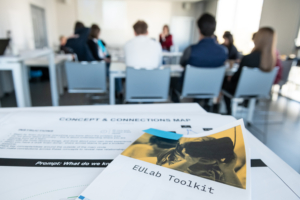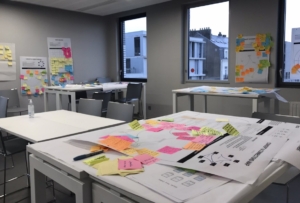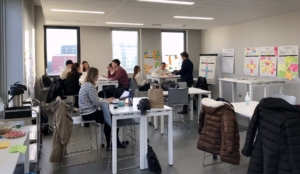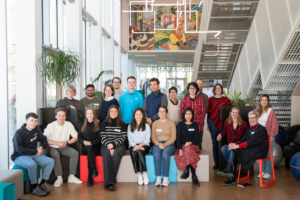- Home
- >
- FACILITATING AND EVALUATING STUDENTS
- >
- Inspiring events
- >
- EULab Initial Reflections
EULab Initial Reflections
It was with great anticipation that we, Céline Louche, Catherine Morel and Jennifer Goodman greeted the 13 participants of the #EULabNantes on 16th January at the Audencia MediaCampus. During this Nantes-based week, participants immersed themselves in the topic of “Feeding Our Cities: Developing Sustainable, Resilient and Inclusive Food Systems”. After a year in the planning and delays due to Covid-19, this innovative, hybrid, educational pilot was finally off the ground!
The ambitious aim of this ongoing ERASMUS+ sponsored project is to explore how business schools can give agency to students to help them become active citizens in developing regenerative futures. Led by the University of Limerick, the project brings together students and faculty members from the four project partners: Limerick (Ireland), Audencia (France), Oulu University Business School (Finland) and Universidad de León (Spain). The EULab Nantes pilot took a blended learning approach with one immersive week including place-based workshops, followed by three weeks online. The broader objective of the EULab project is to prepare infrastructure and recommendations for future iterations of online and hybrid labs. This includes outputs such as a digital blended learning module, policy recommendations for integrating EULab into the ECTS system for virtual exchange, a train the trainer module, and the building of a network of city-based Futures Labs.
The EULab is innovative for several reasons but particularly because it takes a heutagogical, cross-disciplinary, studio-based approach to addressing complex real-world problems. Heutagogy is an instructional strategy which favours the development of autonomy and self-determined learning rather than the more typical pedagogical, top down, teacher-led approaches. In such a context, learners are responsible for identifying problems, establishing a learning destination and independently working through a process in order to reach that destination.
To support the participants in this journey a certain degree of pedagogical infrastructure was necessary. Before arriving in Nantes, we held two online sessions developed by experts at León and Limerick Universities. The sessions aimed at orientating the students towards the tools and collaborative platforms they would be using, and sensitising them to the fundamental aspects of the EULab. Further scaffolding came in the form of three main areas of focus: systems, futures and markets. A kit of nine systemic design tools was developed specifically to provoke thinking and ideas in each area.
The face-to-face week allowed the participants to submerge themselves in the context of Nantes and to meet key actors from the field who shared their insights and experiences of the existing local food system. Our role as faculty was twofold: as experts in the subject matter and context, participants could call on us to ask specific questions about Nantes or food systems. A second role was to focus the students on the process of using the design tools and to encourage them to reflect on how the tools were helping or hindering them in discovering different aspects of the food system.
The week itself was very intensive with a lot of onsite visits, teamwork and feedback sessions. Post-it notes multiplied daily on the walls to populate rather sophisticated systems design tools. The participants built a strong connection with the other group members and brought their full attention to the class and the topic. A particular challenge for the faculty was to step away from our more traditional pedagogical practices and resist commenting positively or negatively on outcomes and content or leading the students in a particular direction. Rather, our task was to keep the focus on the process and encourage them to reflect on what was happening. Students found this way of working quite a change from traditional teaching and it took them some time over the week to realise there was not one specific outcome that was expected. Even during the online follow up this remains challenging for some of the participants. Another interesting aspect was holding the participants at the problem stage rather than moving quickly to a solutions phase. This again goes against what is typically taught in our “solutions-oriented” institutions.
The students’ and faculty’s learning curve has been systematically captured and documented and will constitute part of the research attached to the EULab project that will end in September 2023.
For further information
https://www.eulab.org and #EULabNantes on Twitter and LinkedIn











